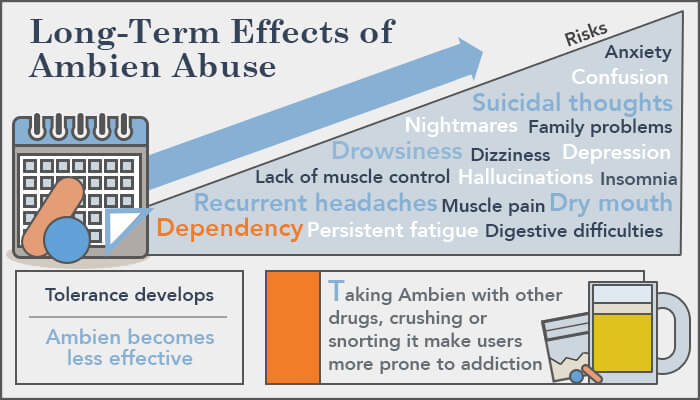Long-Term Ambien Use and Severe Addiction
What Are the Risks of Long-Term Ambien Use?
People who abuse large amounts of Ambien, or who have a longstanding Ambien abuse habit, can experience:
- Digestive difficulties
- Persistent fatigue
- Recurrent headaches
- Dry mouth
- Muscle pain
- Lack of muscle control
- Dizziness
- Drowsiness
- Depression and/or suicidal thoughts
- Hallucinations
- Confusion
- Anxiety
- Nightmares
- Insomnia
- Feelings of withdrawal between doses
- Family problems
- Unemployment
- Bankruptcy
- Addiction
Up to 30 percent of adults have difficulty sleeping, and at least 10 percent of these individuals have insomnia that is severe enough to interfere with their daily lives, states the American Academy of Sleep Medicine.
Sleep medications, also known as sedative or hypnotic drugs, can help people with insomnia fall asleep more quickly, stay asleep longer, or get more satisfying sleep. Zolpidem, sold under the trade name Ambien, is one of the newer sleep aids on the market. Ambien is usually prescribed for no more than six weeks and recommended for shorter periods of time, if possible.

However, some individuals find it difficult or impossible to sleep without Ambien, and they may continue to use the drug past the recommended timeframe. Others may develop a problem with Ambien after using the medication for recreational reasons. No matter what the original cause of addiction may be, long-term Ambien use can have hazardous effects on the user’s physical health, psychological wellbeing, job performance, and home life.
Health Concerns of Long-Term Use

Zolpidem is classified as a non-benzodiazepine hypnotic medication. This medication targets receptor cells in the brain that respond to gamma-aminobutyric acid, or GABA, a neurotransmitter that affects sleep cycles, emotional responses, and levels of consciousness. Ambien was designed to work in similar way to drugs in the benzodiazepine family, such as diazepam (Valium), which have been prescribed for sleep for many years. As a result, many of the long-term health risks of Ambien are similar to the complications of benzodiazepines like Valium or lorazepam (Ativan). Listed below are some of the most frequently reported physical side effects of long-term Ambien use:
- Digestive problems
- Chronic fatigue
- Frequent headaches
- Dry mouth
- Muscle pain
- Poor motor coordination
The Question of Ambien Addiction
Ambien was originally synthesized to be a less addictive alternative to benzodiazepines like Valium (diazepam) and Ativan (lorazepam). For decades, Valium and other drugs in the benzodiazepine family have been prescribed to help patients with anxiety or sleep disorders. However, these popular medications proved to have a potential for abuse and addiction, and many people who initially took benzodiazepines for legitimate medical reasons developed chemical dependency or an addiction to the drug.
There has been some controversy over whether or not Ambien is addictive. Research published in the British Journal of Clinical Pharmacology indicates that the consequences of Ambien abuse meet some of the most important criteria of chemical dependency, including:
- Tolerance, or the need for higher doses of Ambien in order to achieve the same results
- Withdrawal, or the presence of uncomfortable physical and psychological reactions to the sudden discontinuation of the drug
- Compulsive use, or a preoccupation with using the medication in spite of its negative consequences on health, job performance, or relationships
- Manipulative or unethical behavior, such as drug-seeking, forging prescriptions, or faking symptoms in order to obtain more of the drug
For recreational users, Ambien may not act as a sedative, but as a stimulant, creating feelings of pleasure and euphoria. These users often take the drug in high doses or in unsafe ways, such as crushing the pills and snorting them, or mixing Ambien with alcohol. Taking Ambien recreationally, or combining Ambien with other drugs or alcohol, makes the user even more prone to dependency and addiction. Withdrawal, one of the hallmark signs of drug addiction, has been observed in long-term Ambien users. People who have become accustomed to taking high doses of Ambien often feel anxious, restless, agitated, shaky, and tired when they attempt to quit the drug too quickly. Nausea, vomiting, delirium, and seizure activity have also been reported. The Primary Care Companion for CNS Disorders published the case study of a woman who experienced severe seizures after her zolpidem was suddenly discontinued. Case studies like this one indicate that long-term users should be aware of the possibility of zolpidem withdrawal syndrome, and that a medically supervised drug taper may be necessary to prevent those symptoms.
Ambien’s Impact on Home Life and Relationships

As a prescription sleep aid, Ambien serves the legitimate medical purpose of helping people overcome the effects of insomnia.
However, the fact that Ambien is prescribed by physicians and therapists doesn’t mean that this medication is safer than other drugs. The risks of Ambien in long-term users, and in users with addictive disorders, are still under investigation, but current research suggests that this medication may not be as harmless as the medical community once believed.
Over time, Ambien abuse and addiction affect every aspect of a person’s life, from physical health to emotional wellbeing and the quality of family relationships. Addiction can separate spouses, parents, and children by establishing an atmosphere of dishonesty and distrust at home. Rebuilding an atmosphere of support, trust, and safety in the home is one of the primary goals of family therapy, a key component of any comprehensive rehab program.
No matter how long an individual has been using Ambien, or how severe the abuse has become, professional recovery programs can help restore health and hope. A rehab program for Ambien abuse can prevent some of the serious consequences of addiction and empower clients to create more stable, sober lives for themselves and their loved ones.
